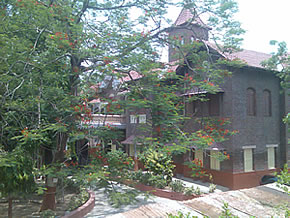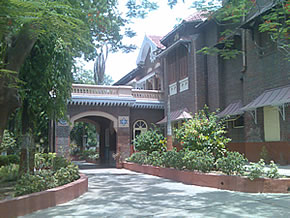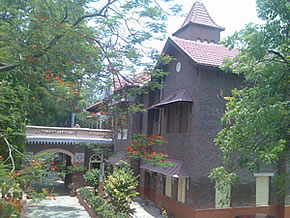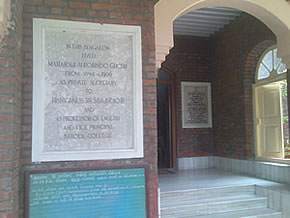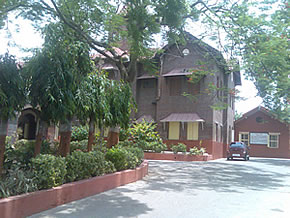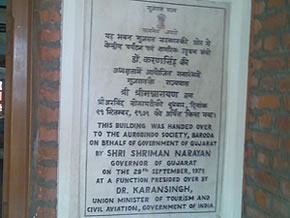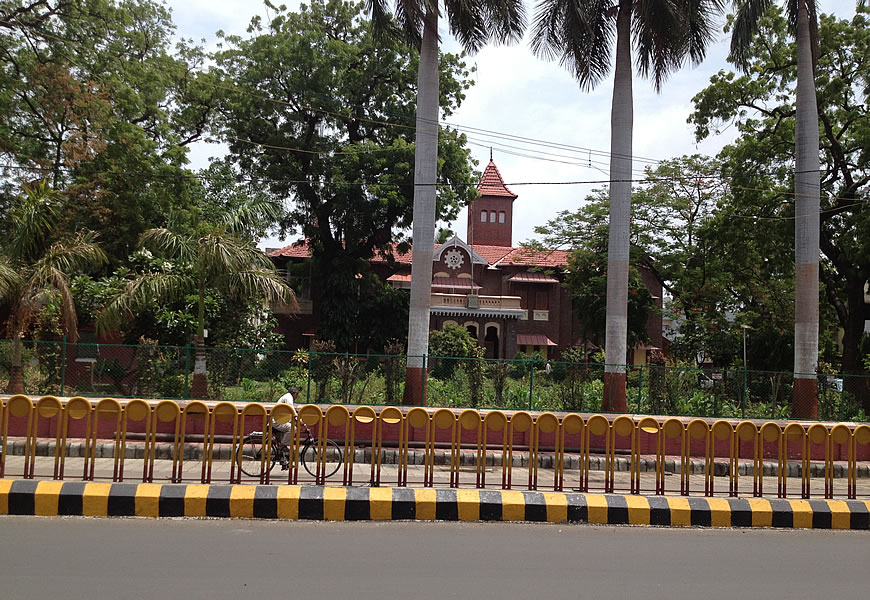
Built in 1896, the Aurobindo Ashram (also known as Aurobindo Nivas) at Dandia Bazaar is Vadodara’s only National Memorial. The place was home to Sri Aurobindo, India’s leading philosopher, litterateur and poet. Made entirely in wood, the ashram is surrounded by a garden and a lotus pond, all made and managed by the devotees. While the lower floors house the office, the library, the museum and the store, the upper floors have the meditation chambers and the reading room. The place also has a nursery, a conference room, an area for conducting yoga classes
and an open-air stage that has the map of undivided India.
Sri Aurobindo Nivas is a beautiful and spacious building built from red bricks and mortar. It has 23 big and small rooms and the surrounding open land is 55,000 sq. ft. During the Birth Centenary Celebration year of Sri Aurobindo, the Divine Mother blessed the devotees at Baroda by granting the Holy Relics of Sri Aurobindo which were enshrined on the open land of the building on 24-11-1972 and a shrine was constructed over it.
Sri Aurobindo was principal of the Baroda College from 1893-1906 and was secretary to Maharaja Sayajirao Gaekwad III. He wrote the king’s speeches. Philosopher, poet, patriot, social and political thinker, he was born in Calcutta on 15th August 1872. At the age of seven he was taken to England for education and in 1890 went to King’s College, Cambridge. Here he stood in the first class in the classical Tripos and also passed the final examination for the Indian Civic Service. Not wishing to serve in the ICS he disqualified himself by not attending the riding test. He obtained employment in the service of the Maharaja of Baroda and returned to India in 1893. Sri Aurobindo served for 13 years in the administrative departments of the Baroda state and Baroda College. He worked in the administrative department, secretariat and finally as a professor and Vice-Principal of Baroda College. He stayed in Baroda, from 1893 to 1906; these 13 years were his longest stay at one place in India except for Pondicherry. It was during his stay here that he acquired mastery over Sanskrit, learnt other Indian languages, made deep studies of political, cultural and other problems of India, started doing yoga and realised the essential truths of past spiritual experiences. Baroda was his ‘Karmabhoomi’ and Pondicherry his ‘Tapobhoomi’.
The bungalow that was his residence in Baroda is now known as Sri Aurobindo Nivas. Sri Aurobindo Society, Baroda branch, requested the Gujarat government to hand over this bungalow to the Society to develop it as a memorial. The bungalow was handed over to Sri Aurobindo Society on 29th September 1971 to develop it as a permanent memorial to Sri Aurobindo and to spread his message and teachings among the people.
Sri Aurobindo Society, Baroda Branch, has undertaken various activities, services and programmes for physical, emotional, intellectual, cultural, educational and spiritual development of the people. It is not only a local centre but also the headquarters of Sri Aurobindo Society, Gujarat State Committee, which represents about 100 Sri Aurobindo Centres in Gujarat.
Activities:
Yoga Classes: For people from all walks of life and of different age groups.
Publications: ‘Arpan’ Gujarati monthly magazine spreads the teachings of Sri Aurobindo and the Mother. Also, books on Yoga.
Library and Reading Room: The library has a rich collection of books and magazines, not only of Sri Aurobindo and the Mother but also of other spiritual writers.
Permanent Photo Exhibition: A permanent exhibition of photographs – ‘Sri Aurobindo Jeevan Darshan’ – depicting his life, events and selected writings was set up in 1993.
